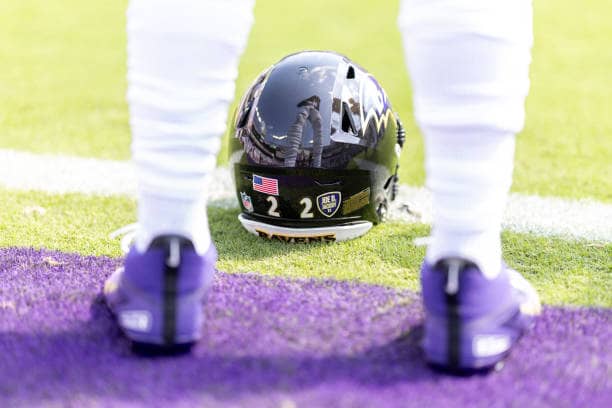Table of Contents
For most offensive skill position players in the NFL, their top award is the NFL Offensive Player of the Year.
While the NFL MVP award is the sport’s most prestigious individual award and attracts the most attention, it’s completely dominated by quarterbacks (16 of the last 17 have gone to QBs). Non-quarterbacks are far more likely to win Offensive Player of the Year, which rewards running backs and wide receivers more frequently than MVP voting does.
The award, which has been around since 1972, is one of numerous NFL awards that you can bet on at our favorite NFL betting sites.
Betting on the OPOY is the same as betting on the Super Bowl winner or any other futures market. Odds will shift as the season progresses due to trades, injuries, slumps, hot streaks and various other factors.
Many players will start the season with plus odds, which then get shorter throughout the season as frontrunners emerge.
Here’s a comprehensive guide to betting on the award, including NFL Offensive Player of the Year odds.
NFL OPOY Odds
See below for this season’s NFL Offensive Player of the Year odds entering NFL Week 14. NFL OPOY odds vary by sportsbook and subject to change.
- Saquon Barkley: -500
- Derrick Henry: +450
- Ja’Marr Chase: +1500
- Josh Allen: +4000
- Lamar Jackson: +6000
- Josh Jacobs: +6000
- Justin Jefferson: +6000
- Jahmyr Gibbs: +7500
- Amon-Ra St. Brown: +7500
NFL OPOY Award Winners
Here’s the complete list of every NFL Offensive Player of the Year winner since its inception in 1972.
- 1972: Larry Brown, RB, Washington Redskins
- 1973: O.J. Simpson, RB, Buffalo Bills
- 1974: Ken Stabler, QB, Oakland Raiders
- 1975: Fran Tarkenton, QB, Minnesota Vikings
- 1976: Bert Jones, QB, Baltimore Colts
- 1977: Walter Payton, RB, Chicago Bears
- 1978: Earl Campbell, RB, Houston Oilers
- 1979: Earl Campbell, RB, Houston Oilers
- 1980: Earl Campbell, RB, Houston Oilers
- 1981: Ken Anderson, QB, Cincinnati Bengals
- 1982: Dan Fouts, QB, Cincinnati Bengals
- 1983: Joe Theismann, QB, Washington Redskins
- 1984: Dan Marino, QB, Miami Dolphins
- 1985: Marcus Allen, RB, Los Angeles Raiders
- 1986: Eric Dickerson, RB, Los Angeles Rams
- 1987: Jerry Rice, WR, San Francisco 49ers
- 1988: Roger Craig, RB, San Francisco 49ers
- 1989: Joe Montana, QB, San Francisco 49ers
- 1990: Warren Moon, QB, Houston Oilers
- 1991: Thurman Thomas, RB, Buffalo Bills
- 1992: Steve Young, QB, San Francisco 49ers
- 1993: Jerry Rice, WR, San Francisco 49ers
- 1994: Barry Sanders, RB, Detroit Lions
- 1995: Brett Favre, QB, Green Bay Packers
- 1996: Terrell Davis, RB, Denver Broncos
- 1997: Barry Sanders, RB, Detroit Lions
- 1998: Terrell Davis, RB, Denver Broncos
- 1999: Marshall Faulk, RB, St. Louis Rams
- 2000: Marshall Faulk, RB, St. Louis Rams
- 2001: Marshall Faulk, RB, St. Louis Rams
- 2002: Priest Holmes, RB, Kansas City Chiefs
- 2003: Jamal Lewis, RB, Baltimore Ravens
- 2004: Peyton Manning, QB, Indianapolis Colts
- 2005: Shaun Alexander, RB, Seattle Seahawks
- 2006: LaDainian Tomlinson, RB, San Diego Chargers
- 2007: Tom Brady, QB, New England Patriots
- 2008: Drew Brees, QB, New Orleans Saints
- 2009: Chris Johnson, RB, Tennessee Titans
- 2010: Tom Brady, QB, New England Patriots
- 2011: Drew Brees, QB, New Orleans Saints
- 2012: Adrian Peterson, RB, Minnesota Vikings
- 2013: Peyton Manning, QB, Denver Broncos
- 2014: DeMarco Murray, RB, Dallas Cowboys
- 2015: Cam Newton, QB, Carolina Panthers
- 2016: Matt Ryan, QB, Atlanta Falcons
- 2017: Todd Gurley, RB, Los Angeles Rams
- 2018: Patrick Mahomes, QB, Kansas City Chiefs
- 2019: Michael Thomas, WR, New Orleans Saints
- 2020: Derrick Henry, RB, Tennessee Titans
- 2021: Cooper Kupp, WR Los Angeles Rams
- 2022: Justin Jefferson, WR, Minnesota Vikings
- 2023: Christian McCaffrey, RB, San Francisco 49ers
NFL OPOY By Position
While the running back position has become devalued across the NFL, it’s the most well-represented position in Offensive Player of the Year awards. See below for a breakdown of the award’s winners by position:
- Running back: 27
- Quarterback: 20
- Wide Receiver: 5
Three of the wide receiver wins have come in the last five years as pass-catchers have become more important due to increased emphasis on passing.
Interestingly, zero tight ends have won the award despite impressive seasons from the likes of Travis Kelce, Rob Gronkowski and others. That’s because they spend much of their time on offense blocking, which limits their impact in the passing game.
Players With Multiple NFL OPOY Awards
Eight players have won multiple Offensive Player of the Year Awards.
- Marshall Faulk (3)
- Earl Campbell (3)
- Jerry Rice (2)
- Barry Sanders (2)
- Tom Brady (2)
- Terrell Davis (2)
- Drew Brees (2)
- Peyton Manning (2)
Rice is the only wide receiver to win the award twice, while Brady, Brees and Manning are the only quarterbacks to win OPOY multiple times. This proves how hard it is for non-running backs to win.
Tips For Betting NFL OPOY
The first thing to know when thinking about the Offensive Player of the Year Award is that it’s usually given to a player who breaks a record or comes close to breaking a record.
The first example of that was O.J. Simpson, who won the award in its second year (1973) after becoming the first player in NFL history to rush for 2,000 yards in a season.
Some other record-breaking performances that led to OPOY awards were Dan Marino in 1984 (when he became the first player to pass for 5,000 yards), Drew Brees in 2011 (when he broke Marino’s record) and Peyton Manning, who broke the single-season records for passing yards (5,477) and touchdowns (55) in 2013.
One notable time a player set a record but didn’t win the award came in 1984 when Eric Dickerson broke O.J. Simpson’s rushing record in the same year that Marino broke the passing record.
The award is almost always given to a player in the prime of his career, as the average winner through 2023 was 27.5 years old and had been in the league for 5.1 years when they won the award.
Those numbers fluctuate a bit when you break them down by position:
- RB winners: 25.9 years old, 3.7 seasons
- QB winners: 30.1 years old, 7.2 seasons
- WR winners: 26.6 years old, 3.8 seasons
This makes sense, as running backs tend to peak early and have shorter careers. Meanwhile, quarterbacks typically peak later and have longer careers.
Of the quarterbacks who have won, only Dan Marino (1984) and Patrick Mahomes (2018) were younger than 25 when they took home the hardware. In fact, 12 of the 20 quarterback winners have been over 30, including the oldest player to win the award (37-year-old Peyton Manning in 2013).
Accordingly, age isn’t as important when targeting a quarterback to win this award. However, age matters more for running backs, who tend to wear down early from all the hits they take.
For example, 18 of the 27 RB winners were 26 or younger when they won the award. Most running backs are past their primes by their late 20s, and few keep playing into their 30s.
It’s also important to pick a player with an established track record of success. Only one player (Earl Campbell) has won the award as a rookie, while only seven winners had never won any kind of major NFL award prior to their OPOY season.
In other words, experience matters when it comes to winning this award.
Supporting Cast For NFL OPOY
Only three players have won the award without having another Pro Bowl player on the roster (Walter Payton in 1977, Earl Campbell in 1978 and Cooper Kupp in 2021), so it’s important to back a player with a talented group around him.
The most common Pro Bowl teammate position for a winner is wide receiver (27), and the second most common position is left tackle (26). That makes sense, as great quarterbacks often have great receivers to throw to and great running backs need good offensive linemen to block for them.
Furthermore, 37 winners have had multiple Pro Bowl teammates on their offense, so it’s generally wise to target players in high-scoring offenses.
Drew Brees is the only quarterback to win the award without a Pro Bowl pass catcher, so make sure to target a quarterback with at least one elite receiver to throw to.
For running backs, it’s all about the offensive line. The majority of the 27 running back winners have had a Pro Bowl offensive lineman blocking for them in the season they won their award.
While having a Pro Bowl passer is important when it comes to winning a Super Bowl and building a balanced offense, it’s not necessary for a running back to win the award. Only half of the running backs who won the award had a Pro Bowl quarterback in the backfield with them.
Not surprisingly, four of the five wide receivers who won the award had a Pro Bowl quarterback throwing to them, with Kupp being the lone exception. That said, Kupp recorded the most receiving yards of any receiver who won (1,947), so he rose above not having a Pro Bowl QB.
Skill Sets to Target for OPOY Betting
It may sound obvious, but you should target a dynamic player.
For running backs, that means versatile backs who rack up yards through the air and on the ground. While eight of the last 13 running backs to win the award have topped 1,800 rushing yards, nine of the last 13 running backs to win the award have also had at least 500 receiving yards.
For reference, running backs who won the award have averaged 1,714 rushing yards, 14 rushing touchdowns, 398 receiving yards and 2.5 receiving touchdowns. Look for an RB who can tally over 2,000 total yards and average a touchdown per game.
When it comes to quarterback, being a dual-threat is less important. Of the 20 quarterbacks who won the award, only eight had at least 200 rushing yards in the year they won. In other words, don’t be afraid to bet on a pocket passer who doesn’t add much with his legs.
Quarterback winners have averaged 4,163 passing yards and roughly 36 passing touchdowns compared to just 164 rushing yards and two rushing touchdowns. Accordingly, focus on quarterbacks with good passing numbers rather than shaky throwers who run well.
Wide receivers averaged 1,612 yards and 14 touchdowns in the seasons they won the award, so you’ll need to target a receiver who gets a lot of volume and red-zone targets. Jerry Rice had “only” 1,078 receiving yards when he won the award in 1987, but he compensated with 22 touchdowns.
It takes a near-generational performance for a wide receiver to win this award, so you should only target a wideout if you have a lot of faith in their volume and ability to do something with the ball in their hands.
Photo by Michael Owens/Getty Images


